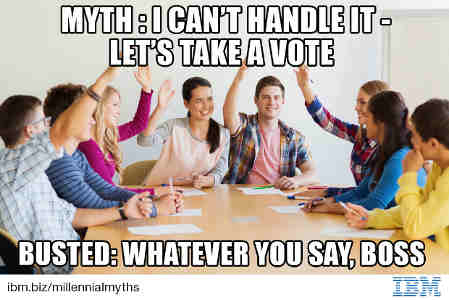Are Millennial Employees Lazy, Selfish and Shallow?
A new IBM study reveals that much of the hype about Millennial employees isn’t true. They aren’t the “lazy, entitled, selfish and shallow” workers that many believe them to be, says IBM.
The results of the global, multigenerational study “Myths, Exaggerations and Uncomfortable Truths” found that the fundamental distinction between Millennials and older employees is their digital proficiency, which comes from growing up immersed in a digital world.
But, for things like career goals, employee engagement, preferred leadership styles and recognition, the study shows that Millennials share many of the same attitudes as Gen X and Baby Boomer employees.
[ Nine Signs You’re Working in a Sick Company ]
By 2020, Millennials will be approximately 50 percent of the U.S. workforce. So within the next five years, Millennials will wield increasing influence over organizations’ decisions, move in to leadership roles and basically take over the workforce.
Today’s business leaders need to begin planning for this shift by creating a workplace environment that will maximize the Millennial generation’s unique strengths.
To do so, according to IBM, they first need to separate fact from fiction on what Millennial employees are really all about. The IBM Institute for Business Value examined five commonly held beliefs about Millennials.
Myth 1: Millennials’ career goals and expectations are different from their elders (i.e. unrealistic).
As it turns out, Millennials want financial security and a diverse workplace just as much as their older colleagues.
Myth 2: Millennials need endless praise and think everyone should get a trophy.
Millennials’ idea of a perfect boss isn’t someone who pats them on the back. They’re looking for an ethical and fair boss who shares information. Thirty-five percent of Boomers and Millennials listed this as the top quality they seek in a boss. Last on the priority list for Millennials? A boss who asks for their input.
Funny enough, it’s Gen X employees, not Millennials, who are more likely to think everyone on a successful team should be rewarded. 64 percent of Gen Xers agreed with this statement compared to 55 percent of Millennials.
Myth 3: Millennials are digital addicts with no boundaries between work and play.
Millennials are less likely than older generations to use their personal social media accounts for business purposes. Twenty-seven percent of Millennials never do so — compared to only 7 percent of Boomers.
Millennials enter the workforce with a strong social presence and personal social media strategy. They know what they want to communicate, where they want to share it and how it best suits their audience.
Myth 4: Millennials can’t make a decision without crowdsourcing.
Millennials value others’ input, but are no more likely to seek advice when making work decisions than Gen X. And, even though they think gaining consensus is important, more than fifty percent of Millennials believe that their leaders are most qualified to make business decisions.
Myth 5: Millennials are more likely to jump ship if a job doesn’t fulfill their passions.
Millennials change jobs for the same reasons other generations do, and they are no more likely than older colleagues to leave a job to follow their passion. In fact, Millennials, Gen Xers and Baby Boomers are all two times more likely to leave a job to enter the fast lane – i.e. to make more money and work in a more innovative environment — than any other reason, including saving the world.
IBM suggests employers can’t rely on generational stereotypes when planning and serving their workforce. They need robust, nuanced talent strategies and analytics to better understand employees as individuals to make the most of their skills.












